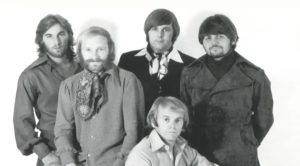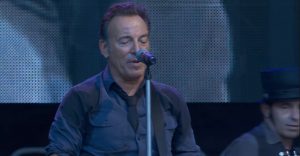1978 Was Awesome Because Of These 10 Classic Rock Songs

via Van Halen / YouTube
By the late ’70s, rock music was fighting to hold its ground. Punk was tearing through the underground, disco ruled the dance floors, and polished pop acts were climbing the charts. To some fans, it felt like rock’s golden era was slipping away. But 1978 proved that the spirit of rock wasn’t going down without a fight.
Rather than retreat, many of the year’s best rock artists leaned into the chaos. They didn’t just survive the changing musical landscape — they evolved with it. Some sprinkled in a little disco rhythm, others sharpened their edge with a rawer, punk-inspired energy. The result was a wild, unpredictable batch of songs that still carried that rebellious classic rock soul, just with a few new tricks up their sleeves.
Looking back, 1978 stands out as a turning point — not because rock stayed the same, but because it adapted without losing its heart. The songs that defined the year show a genre stretching, bending, and occasionally snarling its way through a fast-changing world. And somehow, against all odds, it worked.
10. Warren Zevon – “Werewolves of London”, Excitable Boy
Warren Zevon’s “Werewolves of London” remains one of the most distinct and clever songs of 1978. With its catchy piano riff and deadpan humor, the track captures a snapshot of late-’70s L.A. culture in a way few others could. It’s playful on the surface, but there’s an underlying bite to Zevon’s lyrics that gives it lasting power.
The song’s recording lineup reads like a rock hall of fame: Mick Fleetwood and John McVie of Fleetwood Mac anchor the rhythm section, and Jackson Browne helped shepherd the project to life. That combination of talent created a performance that feels both loose and laser-sharp. Every beat and every note falls exactly where it should, giving Zevon’s sardonic story the perfect backdrop.
Excitable Boy, the album from which this track comes, is often cited as Zevon’s masterpiece, and “Werewolves of London” is its most enduring moment. Despite being his only Top 40 hit, Zevon used it to cement his reputation as one of rock’s smartest and most singular voices. Beneath the howls and humor lies a rock performance that has never gone out of style.
9. The Cars – “Just What I Needed”, The Cars
When The Cars burst onto the scene with their self-titled debut, they didn’t quite fit into any existing genre neatly. They blended synth-driven sounds with sharp guitar riffs, offering something that wasn’t fully New Wave but also wasn’t traditional rock. “Just What I Needed” perfectly encapsulates that blend, capturing the best of both worlds.
From the first crunchy guitar chord to the soaring chorus, “Just What I Needed” sounds effortless but incredibly tight. Ric Ocasek’s detached, ironic lyrics played off the band’s slick instrumental backdrop, creating a dynamic that would define The Cars’ early years. It’s bright, punchy, and surprisingly durable even decades later.
As a debut single, it couldn’t have been more perfect. “Just What I Needed” immediately made The Cars a band to watch and helped set the tone for late-’70s rock radio. Its influence can be heard in countless songs that followed, yet it still stands on its own as a brilliantly executed pop-rock gem.
8. Rod Stewart – “Da Ya Think I’m Sexy?”, Blondes Have More Fun
By 1978, Rod Stewart had already proven he could master traditional rock, folk, and soul sounds. So when he dipped his toes into disco with “Da Ya Think I’m Sexy?,” it felt more like a natural evolution than a betrayal. The track’s thumping bass and glossy production were perfectly in step with the times.
Critics and some fans weren’t entirely thrilled, accusing Stewart of selling out. But strip away the disco sheen, and “Da Ya Think I’m Sexy?” is just a fantastic pop song with a rhythm section that grooves hard. It’s playful, a little sleazy, and undeniably catchy — all classic Rod Stewart traits, just dressed in new clothes.
Time has been kinder to this track than many initially thought. While some of his contemporaries floundered trying to chase trends, Stewart showed he could still be relevant without losing his distinct personality. “Da Ya Think I’m Sexy?” might have been a curveball, but it landed squarely in the sweet spot.
7. Van Halen – “Runnin’ With the Devil”, Van Halen
Few debut albums announce themselves as boldly as Van Halen’s self-titled 1978 record, and “Runnin’ With the Devil” is the opening salvo. From the moment those ominous bass notes fade in, it’s clear that something new and dangerous is happening. Van Halen wasn’t just another rock band — they were a revolution waiting to erupt.
David Lee Roth’s swaggering vocals and Eddie Van Halen’s already mind-bending guitar work combine into a sound that’s both gritty and polished. It wasn’t flashy for its own sake; everything had a purpose, driving the song forward with relentless energy. “Runnin’ With the Devil” gave the world its first real glimpse of Eddie’s genius, changing rock guitar forever.
The song set the tone for what would become one of the biggest rock bands of the next decade. Even though 1978 saw rock facing pressures from all sides, Van Halen showed there was still plenty of life — and danger — left in it. “Runnin’ With the Devil” wasn’t just a great song; it was a warning shot.
6. The Who – “Who Are You”, Who Are You
There’s a bittersweet quality to “Who Are You” that goes beyond its sharp lyrics and thundering beat. Released just weeks before Keith Moon’s death, it stands as the last major statement from The Who’s classic lineup. The song feels heavier and wearier than their earlier work, but no less powerful.
Pete Townshend channels frustration and disillusionment into a song that questions identity in a world that seems to be crumbling. Roger Daltrey’s fierce vocals and Moon’s wild, barely-contained drumming bring the tension to life. It’s a track that feels like it’s about to spin out of control at any moment but holds together through sheer force.
Despite the band’s internal struggles, “Who Are You” remains one of The Who’s finest moments. It captures a band at the end of an era, still capable of delivering a knockout blow. More than just a hit single, it’s a reminder of the raw, unpredictable spirit that made The Who legendary.
5. Bruce Springsteen – “Prove It All Night”, Darkness on the Edge of Town
Bruce Springsteen’s “Prove It All Night” carries the weight of an entire generation’s frustrations and dreams. Even though it cracked the Top 40, it feels more like a climactic scene in a long, winding story rather than a standalone hit. Springsteen’s characters are weary but still fighting, holding onto whatever scraps of hope they can find.
The song’s slow-burning intro on album versions gives way to a tight, urgent performance that mirrors the desperation in the lyrics. There’s a tension bubbling under every note, as if the song could burst wide open at any second. Springsteen and his E Street Band sound sharper and hungrier than ever, matching the stakes of the narrative.
Positioned near the end of Darkness on the Edge of Town, “Prove It All Night” serves as the last defiant gasp before the inevitable fallout. It’s a song about clinging to dreams when everything else is falling apart — and one that showed Springsteen could still channel mythic ambition into hard, uncompromising rock.
4. The Rolling Stones – “Beast of Burden”, Some Girls
Coming off a few years of uneven releases, the Rolling Stones roared back to life with Some Girls — and “Beast of Burden” stands out as one of its most enduring moments. It’s a swaggering, soulful plea, built on a laid-back groove that shows the band at its most effortless and most emotional.
Keith Richards and Ron Wood weave their guitars together into a tight, shimmering tapestry, while Mick Jagger delivers one of his most vulnerable performances. There’s bravado, sure, but there’s also a genuine sense of yearning beneath the surface. “Beast of Burden” isn’t about domination; it’s about connection and exhaustion and compromise.
The song captures the Stones finding a perfect balance between their early rawness and their late-’70s polish. It’s casual but calculated, tender without being soft, and it showed that even after a few stumbles, the world’s greatest rock ’n’ roll band still had a few masterpieces left in them.
3. The Police – “Roxanne”, Outlandos d’Amour
The Police didn’t so much crash onto the scene as they slyly snuck their way in, blending punk attitude with pop melodies and a dose of reggae bounce. “Roxanne” is the song that first hinted at just how much ground the trio could cover. It was polished but edgy, smart but raw — a combination that quickly became their signature.
From the opening acoustic guitar strum to Sting’s earnest, pleading vocals, “Roxanne” unfolds with a casual confidence that belies its complex musicality. Stewart Copeland’s drumming dances around the beat while Andy Summers’ guitar adds a twitchy sense of urgency. Every element is locked in, tight but loose in all the right ways.
Outlandos d’Amour was a bold debut, but “Roxanne” was its undeniable centerpiece. It introduced a band that didn’t play by the old rock rulebook, and it helped push rock music into a more global, eclectic future. More than 40 years later, it’s still one of The Police’s defining songs.
2. Cheap Trick – “Surrender”, Heaven Tonight
“Surrender” is everything great about Cheap Trick packed into three and a half minutes of pure adrenaline. Rick Nielsen’s razor-sharp songwriting and the band’s tight musicianship turn what could have been a simple generational anthem into something sly, self-aware, and absolutely infectious.
There’s a sense of humor woven into the song’s depiction of teenagers realizing their parents aren’t so different from them after all. It’s funny, relatable, and just a little bit rebellious — all wrapped up in one of the catchiest choruses of the decade. Robin Zander’s soaring vocals and Bun E. Carlos’s pounding drums drive it all home.
Heaven Tonight is often hailed as Cheap Trick’s best album, and “Surrender” is its crowning jewel. It’s the kind of song you can crank with the windows down, scream along to at a concert, or quietly nod your head to in your bedroom. However you hear it, it still feels as urgent and alive as it did in 1978.
1. The Rolling Stones – “Miss You,” Some Girls
If “Beast of Burden” showed the Stones could still be soulful, “Miss You” proved they could be current. Borrowing from the booming disco scene without sacrificing their trademark swagger, the band crafted a song that was unmistakably theirs — even as it filled dance floors instead of dive bars.
Built around a slinky bassline and a hypnotic groove, “Miss You” oozes style and tension. Mick Jagger’s drawling vocals ride the beat with effortless cool, while the band adds subtle touches — a twangy guitar here, a whisper of harmonica there — that keep the song rooted in their bluesy DNA. It’s disco-infused, sure, but it’s also pure Rolling Stones attitude.
“Miss You” wasn’t just a hit; it was a lifeline. At a time when many of their peers were struggling to stay relevant, the Stones showed they could still lead the pack. Some Girls became their best album since Exile on Main St., and “Miss You” was the sound of a band refusing to fade away quietly.





















